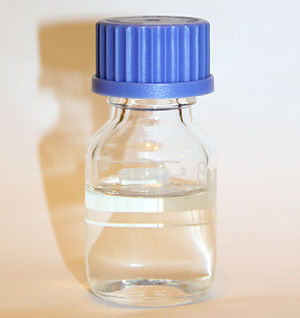Difference between revisions of "Propylene carbonate"
m (→Preparation) |
|||
| Line 13: | Line 13: | ||
==Preparation== | ==Preparation== | ||
| − | PC can be prepared from 1,2-propylene glycol and a metal carbonate. Described here: [http://www.doiserbia.nb.rs/img/doi/1451-9372/2011/1451-93721100018Z.pdf] | + | PC can be prepared from 1,2-propylene glycol and urea with a metal carbonate catalyst. Described here: [http://www.doiserbia.nb.rs/img/doi/1451-9372/2011/1451-93721100018Z.pdf] |
==Projects== | ==Projects== | ||
Revision as of 12:12, 10 July 2016
Propylene carbonate (often abbreviated PC) is an organic compound with the formula CH3C2H3O2CO. It is a carbonate ester derived from propylene glycol. This colorless and odorless liquid is useful as a polar, aprotic solvent. Propylene carbonate is chiral but is used exclusively as the racemic mixture.
Contents
Properties
Chemical
Propylene carbonate is often used as a solvent for electrolysis.
Physical
Propylene carbonate is a colorless liquid freezing at -48.8°C and boiling at 242°C. Propylene carbonate has a vapor pressure of 0.13 mmHg at 20°C, and 0.98 mmHg at 50°C[1].
Availability
Propylene carbonate is sold by chemical suppliers or can sometimes be found on eBay.
Preparation
PC can be prepared from 1,2-propylene glycol and urea with a metal carbonate catalyst. Described here: [1]
Projects
- PC can be used for the electrodeposition of the alkali metals at STP as seen here.
Handling
Safety
Propylene glycol has little toxicity.
Storage
Propylene carbonate can be stored in closed bottles, away from moisture to prevent contamination.
Disposal
As propylene carbonate has low toxicity, it can be safely poured down the drain.
